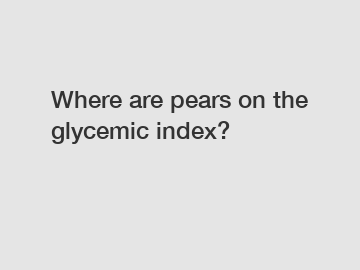Where are pears on the glycemic index?
Guowang contains other products and information you need, so please check it out.
Where are pears on the glycemic index?
Pears are known for their delicious taste and numerous health benefits. They are packed with fiber, vitamins, and minerals, making them a popular choice for a healthy snack. But where do pears stand on the glycemic index? Are they a good option for those concerned about blood sugar levels? Let's explore this question in detail.

First, it is essential to understand what the glycemic index (GI) is. The glycemic index is a scale that ranks foods based on how quickly they can raise blood sugar levels. Foods with a high GI are quickly digested and absorbed, causing a rapid increase in blood sugar, while foods with a low GI are digested and absorbed more slowly, resulting in a gradual and steady increase in blood sugar levels.
1. Pears and their GI value:
When it comes to pears, they have a relatively low GI value. A medium-sized pear has a GI score of 38, which falls under the low GI category. This means that consuming pears is unlikely to cause a significant spike in blood sugar levels.
2. Fiber content and blood sugar control:
Pears are high in dietary fiber, and this plays a crucial role in managing blood sugar levels. The fiber in pears slows down the absorption of sugar in the bloodstream, preventing a sudden surge in blood sugar levels. It also helps in keeping you fuller for longer, reducing the likelihood of overeating or consuming unhealthy snacks.
3. Nutritional benefits of pears:
Pears are not only low on the glycemic index but also offer several nutritional benefits. They are an excellent source of vitamin C, vitamin K, and fiber. Pears also contain antioxidants that help in reducing inflammation and protecting against various chronic diseases. The fiber in pears aids digestion, promotes a healthy gut microbiome, and supports weight management.
4. Benefits for diabetes management:
For individuals with diabetes, pears can be a healthy addition to their diet. The low GI value of pears ensures that they won't cause a rapid spike in blood sugar levels. Furthermore, the high fiber content helps regulate blood glucose levels, preventing sudden peaks and crashes. Including pears in a balanced meal plan can contribute to overall glycemic control.
In conclusion, pears are a suitable fruit choice for individuals concerned about the glycemic index. With their low GI value and high fiber content, pears can be a part of a healthy diet. They provide essential nutrients, support digestive health, and may aid in managing blood sugar levels, especially for individuals with diabetes. So, go ahead and enjoy the sweet and juicy goodness of a pear without worrying about its impact on your blood sugar!
If you are looking for more details, kindly visit How to Ripen Pears at Home.



